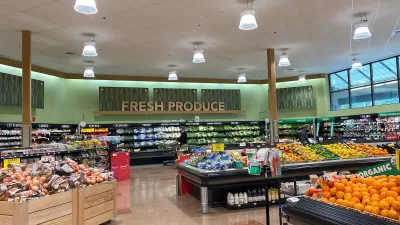As government funding for programs that make fresh fruits and vegetables available to low-income women and young children get cut, Sarah Parsons asks how to make the sustainable food movement less elitist.
Parsons bemoans the reductions in government funding for the Women, Infants and Children (WIC) Farmers Market Nutrition Program, but sees a larger problem in the fundamental causes that make sustainable food inaccessible to many, of which "price tags are just a small piece of the very complex puzzle."
Among the causes Parsons identifies as obstacles to accessibility are unfair federal crop subsidies (which "mean that industrial-scale growers who make ingredients for cheap, commodity products are able to produce and sell their wares at lower prices") and geographic challenges ("Many farmers markets are sited in relatively affluent neighborhoods...More than 23 million Americans live in food deserts, regions where citizens must travel more than a mile to the nearest grocery store").
Parsons highlights some of the innovative projects seeking to overturn this state of affairs. One is Wholesome Wave, a nonprofit that "works to expand access to fresh fruits and vegetables by offering incentives for food stamp recipients to shop at farmers markets." Another is Alice Waters' Edible Schoolyard Project, which has led the way in providing fresh fruits and veggies for students' meals and educating students about sustainable food production.
FULL STORY: Let's Make Sustainable Food Less Elitist

Alabama: Trump Terminates Settlements for Black Communities Harmed By Raw Sewage
Trump deemed the landmark civil rights agreement “illegal DEI and environmental justice policy.”

Planetizen Federal Action Tracker
A weekly monitor of how Trump’s orders and actions are impacting planners and planning in America.

The 120 Year Old Tiny Home Villages That Sheltered San Francisco’s Earthquake Refugees
More than a century ago, San Francisco mobilized to house thousands of residents displaced by the 1906 earthquake. Could their strategy offer a model for the present?

In Both Crashes and Crime, Public Transportation is Far Safer than Driving
Contrary to popular assumptions, public transportation has far lower crash and crime rates than automobile travel. For safer communities, improve and encourage transit travel.

Report: Zoning Reforms Should Complement Nashville’s Ambitious Transit Plan
Without reform, restrictive zoning codes will limit the impact of the city’s planned transit expansion and could exclude some of the residents who depend on transit the most.

Judge Orders Release of Frozen IRA, IIJA Funding
The decision is a victory for environmental groups who charged that freezing funds for critical infrastructure and disaster response programs caused “real and irreparable harm” to communities.
Urban Design for Planners 1: Software Tools
This six-course series explores essential urban design concepts using open source software and equips planners with the tools they need to participate fully in the urban design process.
Planning for Universal Design
Learn the tools for implementing Universal Design in planning regulations.
Clanton & Associates, Inc.
Jessamine County Fiscal Court
Institute for Housing and Urban Development Studies (IHS)
City of Grandview
Harvard GSD Executive Education
Toledo-Lucas County Plan Commissions
Salt Lake City
NYU Wagner Graduate School of Public Service



























